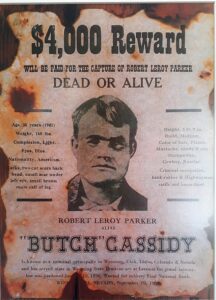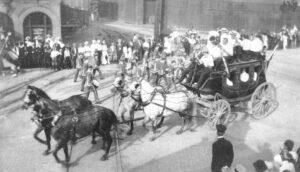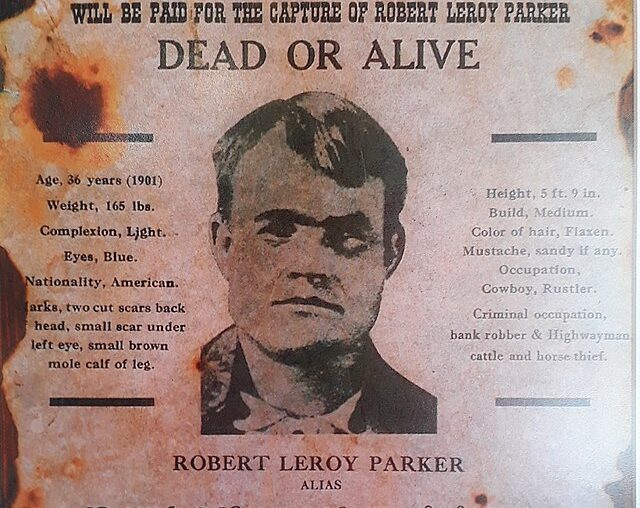 This week sees the publication of my new book, Bandit Heaven: The Hole-in-the-Wall Gangs and the Final Chapter of the Wild West. The main characters are Butch Cassidy and the Sundance Kid, but unlike the classic movie, there is also emphasis on a wide range of colorful characters. Two of them are portrayed in the following excerpt from the book:
This week sees the publication of my new book, Bandit Heaven: The Hole-in-the-Wall Gangs and the Final Chapter of the Wild West. The main characters are Butch Cassidy and the Sundance Kid, but unlike the classic movie, there is also emphasis on a wide range of colorful characters. Two of them are portrayed in the following excerpt from the book:
Joe Walker’s luck began to run out when he once again raided the Whitmore ranch with his partner in crime being James Otis Bliss, a Boston native who by then was known as “Gunplay” Maxwell. They hid the stolen stock in a secluded area known as Mexican Bend on the San Rafael River. But the two had a falling-out and Maxwell got word to the Whitmores where they could find their hidden horses.
Enter Sheriff Allred. He and his deputy, Azariah Tuttle, took off for the San Rafael and surprised Walker near the river, cutting him off from a nearby house. Clambering halfway up the steep bank, the outlaw drew his pistol and started firing. While Allred and Tuttle were in hot pursuit, the latter took a bullet in the leg. The two lawmen found shelter behind some large boulders.
When Walker steadfastly refused to surrender, Allred left the wounded deputy and went back to town for help, herding the stolen horses ahead of him. Walker and Tuttle continued to exchange sporadic shots, but by sunrise, weak from blood loss, the wounded man asked for a truce. Walker agreed to get him a bucket of water if he would toss his guns aside. Each did as he agreed, then Walker staggered out of the canyon and, finding a stray horse, took off.
But later that same year, the outlaw was camped near the town of Thompson with Johnny Herring, a passing cowboy who had shared Walker’s supper. The two bedded down for the night unaware that a nine-man posse had encircled their camp. At dawn, when the sleeping men were emerging from their slumber, the relentless Sheriff Allred and Joe Bush, another member of the posse, called to them to surrender. Instead, Walker and a confused Herring rolled out of their bedding with guns blazing. The posse returned fire. Walker and the unfortunately misidentified cowboy – the posse had believed him to be Butch Cassidy — lay dead near their riddled bedrolls.
Allred had got his man but was pretty steamed for missing out on the $500 reward for the capture or death of the real Butch Cassidy.
Because we may not encounter him again, we can’t leave “Gunplay” Maxwell in the dust just yet. Few, if any, bandits had such intriguing post-outlaw lives. His bandit career ended in May 1898. He and an accomplice robbed the Springville, Utah, bank of $3,000. They fled towards Hobble Creek Canyon with a posse hot on their trail. Nearly 100 horsemen had caught up with the thieves who attempted to hide in the brush. Six-shooters spit bullets and the second bandit was killed. Doing the arithmetic, Maxwell surrendered, so instead of being filled with holes he was taken to the Provo, Utah, jail. In short order, Maxwell was soon convicted of bank robbery and sent to the Utah State Prison. He was back out in only five years because his sentence was commuted when he helped stop a prison break.
In an odd turn of events, the man formerly known as “Gunplay” found the straight life could be more profitable than the outlaw life, and with less chance of prison. In the fall of 1904, Maxwell, trying his hand at prospecting near Colton, Utah, found ozokerite, an odoriferous mineral wax. He soon formed the Utah Ozokerite Company with his lawyer, and the pair hired a superintendent to manage the operations. The mine soon became the largest known ozokerite mine in the world and did so well that it went public.
Making easy money was not terribly interesting, though, so Maxwell next turned up using the name Thomas Bliss in Goldfield, Nevada, working as a spy for mine owners. While keeping an eye on the union’s striking workers, he was involved in the death of a man named Joseph Smith but was not prosecuted. He soon drifted back to Utah, where in July 1907, taking up his nickname again, “Gunplay” Maxwell was involved in a shooting with a railroad foreman named L.C. Reigle. When the smoke cleared, both were wounded. Maxwell was initially arrested but, once again, was not prosecuted.
He next popped up in San Francisco, as William Seaman and claiming to be descended from one of the oldest titled families in Italy. This assertion impressed Bessie Hume enough that the wealthy widow married him. Even after “Seaman” – how Italian was that? — pawned most of his wife’s jewelry, she stayed with him, and the two soon moved to Ogden, Utah. At first, the alleged Italian blueblood shaved his mustache, donned fashionable clothing, and lived the part of an upstanding husband. But, bored again, he strapped on his guns once more. Arrivederci, Bessie.

In June 1908, he and another man named William Walters held up a Wells Fargo stage at Rawhide, Nevada, and were captured. Maxwell was released on bail and – yes, you got it – never prosecuted. It was, finally, not the law but a bullet that, fittingly, got Gunplay.
In August 1909, Maxwell confronted Deputy Sheriff Edward Black Johnstone in a local saloon in Price, where Allred had once patrolled. Johnstone suspected that Maxwell planned to rob a large payroll. Maxwell already held a grudge against Johnstone because he had earlier identified him to a local sheriff in Goldfield as a “bad man” and ex-convict. That this was true did not deter Maxwell from challenging Johnstone in the saloon. Outside on the street, Gunplay told Johnstone he intended to kill him, drew his gun, and fired upon the deputy. However, his shot missed, going through his opponent’s shirt and scratching his arm.
Not depending on luck to save him, Johnstone fired back, hitting Maxwell first in the elbow and then in his heart. Though this may have been the hardest part of his body, Maxwell kicked up dust as he collapsed into the street. He tried to shoot again but Johnstone was faster, hitting the seasoned bandit in the chest. Confirming the obvious, Maxwell exhaled, “Don’t shoot again, Johnstone, you have killed me.”
There was one last twist to Gunplay Maxwell’s life: When his body was being prepared for burial, it showed that his arms were covered in track marks, and opium was found concealed in a pocket. Now viewed as a drug addict in addition to outlaw, he was buried in the pauper’s section of the Salt Lake City Cemetery – under the name William Seaman.
Originally published on Tom Clavin’s The Overlook. If you’d like a signed edition of Bandit Heaven, they are available specifically at Barnes & Noble.

